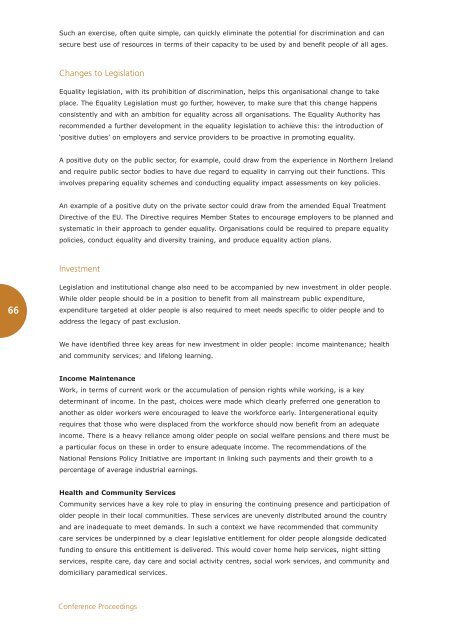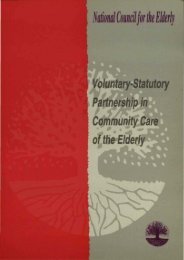From Ageism to Age Equality: Addressing the Challenges ...
From Ageism to Age Equality: Addressing the Challenges ...
From Ageism to Age Equality: Addressing the Challenges ...
You also want an ePaper? Increase the reach of your titles
YUMPU automatically turns print PDFs into web optimized ePapers that Google loves.
Such an exercise, often quite simple, can quickly eliminate <strong>the</strong> potential for discrimination and cansecure best use of resources in terms of <strong>the</strong>ir capacity <strong>to</strong> be used by and benefit people of all ages.Changes <strong>to</strong> Legislation<strong>Equality</strong> legislation, with its prohibition of discrimination, helps this organisational change <strong>to</strong> takeplace. The <strong>Equality</strong> Legislation must go fur<strong>the</strong>r, however, <strong>to</strong> make sure that this change happensconsistently and with an ambition for equality across all organisations. The <strong>Equality</strong> Authority hasrecommended a fur<strong>the</strong>r development in <strong>the</strong> equality legislation <strong>to</strong> achieve this: <strong>the</strong> introduction of‘positive duties’ on employers and service providers <strong>to</strong> be proactive in promoting equality.A positive duty on <strong>the</strong> public sec<strong>to</strong>r, for example, could draw from <strong>the</strong> experience in Nor<strong>the</strong>rn Irelandand require public sec<strong>to</strong>r bodies <strong>to</strong> have due regard <strong>to</strong> equality in carrying out <strong>the</strong>ir functions. Thisinvolves preparing equality schemes and conducting equality impact assessments on key policies.An example of a positive duty on <strong>the</strong> private sec<strong>to</strong>r could draw from <strong>the</strong> amended Equal TreatmentDirective of <strong>the</strong> EU. The Directive requires Member States <strong>to</strong> encourage employers <strong>to</strong> be planned andsystematic in <strong>the</strong>ir approach <strong>to</strong> gender equality. Organisations could be required <strong>to</strong> prepare equalitypolicies, conduct equality and diversity training, and produce equality action plans.Investment66Legislation and institutional change also need <strong>to</strong> be accompanied by new investment in older people.While older people should be in a position <strong>to</strong> benefit from all mainstream public expenditure,expenditure targeted at older people is also required <strong>to</strong> meet needs specific <strong>to</strong> older people and <strong>to</strong>address <strong>the</strong> legacy of past exclusion.We have identified three key areas for new investment in older people: income maintenance; healthand community services; and lifelong learning.Income MaintenanceWork, in terms of current work or <strong>the</strong> accumulation of pension rights while working, is a keydeterminant of income. In <strong>the</strong> past, choices were made which clearly preferred one generation <strong>to</strong>ano<strong>the</strong>r as older workers were encouraged <strong>to</strong> leave <strong>the</strong> workforce early. Intergenerational equityrequires that those who were displaced from <strong>the</strong> workforce should now benefit from an adequateincome. There is a heavy reliance among older people on social welfare pensions and <strong>the</strong>re must bea particular focus on <strong>the</strong>se in order <strong>to</strong> ensure adequate income. The recommendations of <strong>the</strong>National Pensions Policy Initiative are important in linking such payments and <strong>the</strong>ir growth <strong>to</strong> apercentage of average industrial earnings.Health and Community ServicesCommunity services have a key role <strong>to</strong> play in ensuring <strong>the</strong> continuing presence and participation ofolder people in <strong>the</strong>ir local communities. These services are unevenly distributed around <strong>the</strong> countryand are inadequate <strong>to</strong> meet demands. In such a context we have recommended that communitycare services be underpinned by a clear legislative entitlement for older people alongside dedicatedfunding <strong>to</strong> ensure this entitlement is delivered. This would cover home help services, night sittingservices, respite care, day care and social activity centres, social work services, and community anddomiciliary paramedical services.Conference Proceedings















